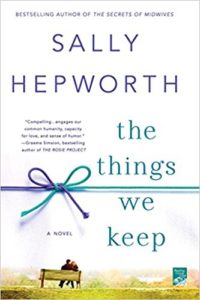Sally Hepworth | Fiction
![]()

Do you know the Kincaid Grade Level Analysis? It is a way to analyze your writing, to ensure that it is clear and easy to read. Some good copywriters will tell you to keep your copy in the Grade 4-7 range (which means it can be read by 9-12 year olds), and even white papers and tutorials below 9 (9 Grade level can be read by the average 14 year old). This is good advice for the choice of words, the sentence and paragraph structure, and so forth.
I want to talk about the content, however. I believe there is a similar “grading” – at least, there is in my mind. But it refers more to intellectual content than to the style of writing and choice of words. Romance novels, for example, even though they may have sexual content, are written in a very simple style – and can appeal to people with quite a range of intelligence. Political and historical and scientific tomes may represent the other end of the scale, requiring high levels of intelligence, concentration, analysis, and focus to read and absorb the information. (Do you know of a scale that actually measures these differences?)
Anyway, my point is The Things We Keep falls a little too low on the “intellectual” scale for my liking. This is the story of Anna who, at age 38, has been diagnosed with “young-onset Alzheimer’s.” In a residential facility, she falls in love with Luke, the only other young person in the care facility. Eve is another major character. She is hired as the cook and cleaner in the care facility. And has her own set of secrets and difficult circumstances. She works to keep Anna and Luke together when others feel the relationship is not safe.
The story is an easy read, and an entertaining one. I simply had hoped for more. I had hoped to get a better understanding of early-onset Alzheimer’s, and the disease’s progress and impact. But instead I read a story … a nice story, an interesting story, a story that I was drawn in to and wanted to resolve … but I wanted more. I wanted to learn more, to have the tale be, well, more “intellectual.”
This is a beach read. That’s the best way to describe it. It is light reading ... lighter than you might expect from such a difficult subject. Unfortunately, there are no beaches here in the high desert!!
list.

I started this book but set aside. It might have been the writing. It might have been the story. I recall it didn’t engage me. I also didn’t find it realistic from what I know and have experienced about Alzheimer’s (older person onset) and assisted living facilities.
Oh yes, you reminded me, I was going to use the word “saccharin.”
If you want a better story about early onset Alzheimer’s try “Still Alice”. I loved it
Good idea, Sigal! It is on my list …
Coincidentally, I was thinking of you this morning, noticing that I had not seen a comment from you a while. It must have been just while you were commenting! Good to hear from you.